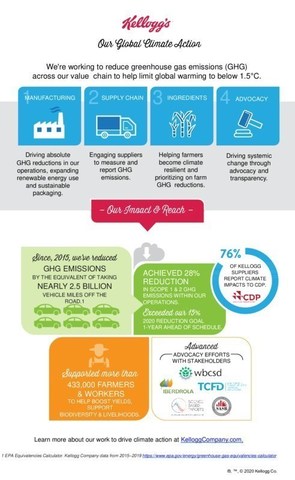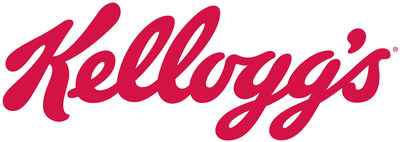Kellogg Company Exceeds Greenhouse Gas Reduction Goal Ahead of Schedule
Kellogg Company has made significant strides in reducing greenhouse gas emissions as part of its Better Days commitment. By 2020, it reduced scope 1 & 2 GHG emissions in manufacturing by over 28%, surpassing its 15% reduction goal ahead of schedule. Kellogg aims for 100% renewable energy by 2050, with nearly 28% of its electricity sourced from renewables. The company also assists over 433,000 farmers in adopting sustainable practices. With 86% of its portfolio being plant-based, Kellogg's products are less impactful on the environment.
- Reduced GHG emissions in manufacturing by over 28% since 2015.
- Exceeded GHG reduction goal of 15% per pound of food produced ahead of schedule.
- Aiming for 100% renewable energy in operations by 2050.
- Nearly 28% of electricity used in production facilities comes from renewable sources.
- Supported over 433,000 farmers worldwide in sustainable and regenerative agriculture.
- None.
Insights
Analyzing...
BATTLE CREEK, Mich., Sept. 16, 2020 /PRNewswire/ -- According to the United Nations, to curb the devastating effects of climate change on the global food supply, the world must halve greenhouse gas (GHG) emissions by 2030. As part of its Kellogg's® Better Days commitment, Kellogg is making tremendous progress limiting GHG emissions in its operations by using low carbon and renewable energy sources, purchasing renewable electricity and increasing energy efficiency. Since 2015, Kellogg has reduced scope 1 & 2 GHG emissions in its manufacturing plants by more than
Kellogg set its first sustainability commitments in 2008, and in 2015 was one of the first companies to set Science-Based Targets to help limit the global warming to below 1.5°C.
"As a global food company, we have a responsibility to address the significant risks climate change poses on people and our planet," said Amy Senter, Kellogg Company Chief Sustainability Officer. "We're proud of our progress and are working on multiple fronts to reduce emissions across our supply chain."
Investing in Renewable Energy Sources
In support of Kellogg's commitment to achieve
Supporting Farmers to Become Climate Resilient
To further mitigate greenhouse gas emissions, Kellogg has helped more than 433,000 farmers globally adopt sustainable and regenerative agriculture practices through its Kellogg's Origins™ program. Rice farmers in Spain reduced their greenhouse gas emissions by as much as
Benefits of Plant-based Foods on the Climate
With
To learn more about the Kellogg's climate goals, progress and advocacy for climate action, visit KelloggCompany.com or read the latest Climate Milestones report.
About Kellogg Company
At Kellogg Company (NYSE: K), we strive to enrich and delight the world through foods and brands that matter. Our beloved brands include Pringles®, Cheez-It®, Special K®, Kellogg's Frosted Flakes®, Pop-Tarts®, Kellogg's Corn Flakes®, Rice Krispies®, Eggo®, Mini-Wheats®, Kashi®, RXBAR®, MorningStar Farms® and more. Net sales in 2019 were approximately
1S.T.A.R. Annual Report-2019 Crop Year - https://img1.wsimg.com/blobby/go/45c3f789-47fb-40df-9bb7-3dc4d7bf6c2f/downloads/Star%20report%20FINAL%202020.pdf?ver=1597671964705, https://www.epa.gov/energy/greenhouse-gas-equivalencies-calculator
![]() View original content to download multimedia:http://www.prnewswire.com/news-releases/kellogg-company-exceeds-greenhouse-gas-reduction-goal-ahead-of-schedule-301132313.html
View original content to download multimedia:http://www.prnewswire.com/news-releases/kellogg-company-exceeds-greenhouse-gas-reduction-goal-ahead-of-schedule-301132313.html
SOURCE Kellogg Company









